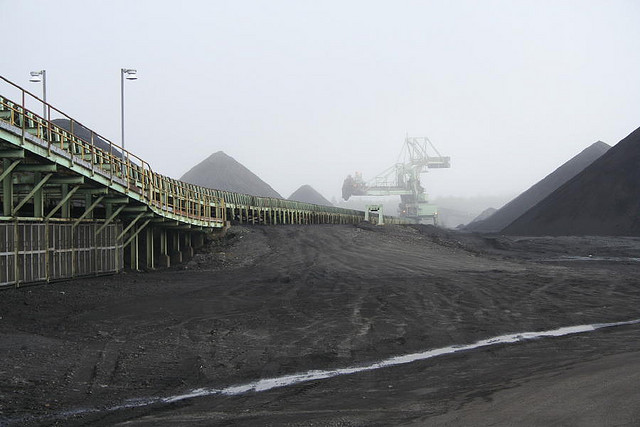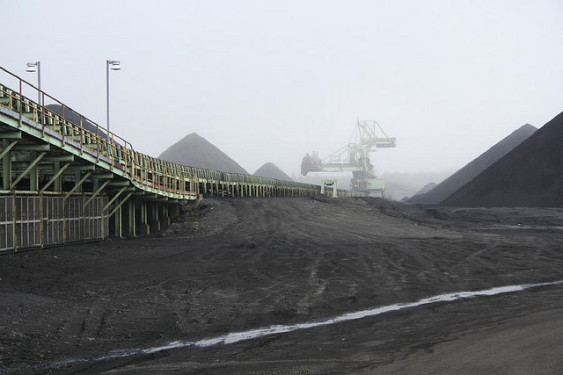Not so long ago, the Ridley coal terminal in Prince Rupert, British Columbia, was riding high. The facility, which mostly exports coal from mines in BC and Alberta to customers in Asia, was seeing steady growth in shipping volumes. With international demand looking strong, coal companies had started to clamor for more port space—and the Canadian government, Ridley’s sole owner, announced plans both to expand the terminal and to sell it to a private owner, no doubt hoping for a hefty profit.
Now, just a few years later, Ridley’s fortunes have turned upside down. International coal prices have gone into freefall, customers have dried up, the terminal’s long-term finances have suffered from a string of shocks, and the proposed sale of Ridley has gone nowhere. Just how bad are things for Ridley? According to the latest statistics, just released today, June 2014 coal shipments at Ridley fell by 55% compared with last June. For the year to date, total coal shipments have fallen by nearly a third, compared with the first six months of 2013.
If anything, Ridley’s woes are just beginning. Here’s just a sampling of the recent news suggesting that Ridley’s facing serious long-term troubles:
- Cancelled shipping contracts. In its most recent annual report, Ridley announced that it had earned $22 million from “relinquished customer deposits and options.” The earnings boost might seem like welcome news, but in this case, it was the opposite: two companies that had already paid millions of dollars to reserve space at the terminal had essentially forfeited their deposits, recognizing that they’d lose even more money if they tried to ship coal overseas. So even though Ridley earned a bit of money in the short haul from the forfeiture, over the long term it lost two major customers.
- Closure of Walter Energy’s BC mines. Facing mounting losses and falling international prices, Walter Energy announced in April that it was shuttering three metallurgical coal mines in east-central British Columbia. All of the mines had been exporting coal through Ridley. One mining complex had already been closed in 2013; another was shut down in April; and the third will be shut down in July. Ridley stands to lose nearly 5 million tons in throughput for the year—about 40 percent of the terminal’s 2013 coal shipments.
- Indefinite delay of the new Vista coal project. A few years back, Ridley put in motion an ambitious plan to expand capacity of the port, in part to handle increased coal volumes at the “Vista” mine, a new mining project in Alberta. But in May the project’s proponent, a mining firm called Coalspur, put the project on indefinite hold, citing challenging coal markets. The news rocked Coalspur’s stock price, forcing the company to admit that it might fold soon if it can’t find new funding.
- Layoffs and delays at Teck. Teck Coal—the western Canadian coal company best situated to weather the downdrafts in the Pacific Rim coal markets—announced in April that it would not try to restart the Quintette mine in northeastern BC, and would actually lay off 5 percent of its workforce. This makes Ridley’s expansion even less necessary.
- Still no luck finding a buyer. The international coal market started its freefall just about the same time that the Canadian government announced its intentions to sell Ridley. So far, no buyer has stepped up. And with so much bad news of late, the government might have to resort to fire-sale pricing to get anyone interested in buying Ridley.
It’s too soon to know Ridley’s fate. As a project of the federal government, the terminal can sustain heavy losses for years and can probably afford to move ahead with its planned expansion even as demand for its services falls.
Still, Ridley serves as a cautionary tale for other would-be coal terminal developments on the west coast of North America. Coal markets are fickle, prices are volatile, and projects that seem like a sure bet in one year can look like dogs a year later. That volatility—and the financial uncertainty it creates—is something that investors and politicians tracking other terminal developments on the west coast of North America would be wise keep in mind.










Kobie Koornhof
Excellent article, Clark!
Michael Riordan
Great stuff, Clark. It may be that economics, aided and abetted by us environmentalists, finally do these bastards in!
Andrew Williams
The same, of course, can be said for export of all other fossil fuels: “markets are fickle, prices are volatile, and projects that seem like a sure bet in one year can look like dogs a year later.” Look what’s happened to Christy Clark’s LNG pipedreams, Enbridge’s bitumen-exporting Northern Gateway, and Kinder Morgan’s expansion plans.